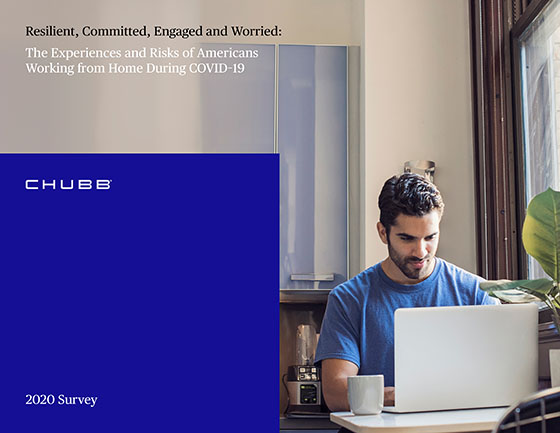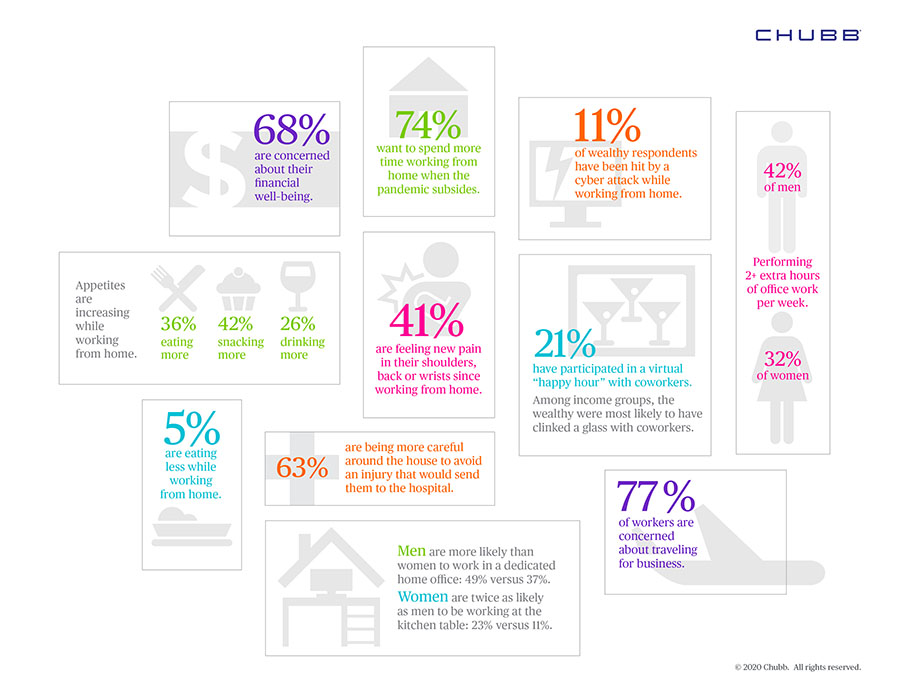Americans Working from Home due to COVID-19 are Productive and Resilient – But Signs of Strain are Showing.
Survey findings address key issues of productivity, work/life balance, emotional and physical wellbeing, anxiety and perceptions about risk.
Download the survey report here

Americans who were fortunate enough to keep their jobs began working from home in mid-March due to the COVID-19 pandemic. This group — an estimated 25% to 30% of the workforce — was thrust overnight into a different way of working.
Chubb wanted to gauge perceptions of the American workers whose home became their workplace. We wanted to understand how they perceived different risks that were new or elevated in a work-from-home environment.
What was their experience? Were they more or less productive? How did they manage work/life balance?
The answers to these and other questions are important even as workplaces reopen. For some who work in large cities and rely on public transportation, the work–from–home environment will continue for some time. Many who are returning to their workplace will continue to work from home part time as part of a staggered schedule. And as business leaders contemplate the workplace of the future, the experiences of people who worked from home during COVID–19’s peak can provide valuable insights about the experiences of workers, the risks they face and maintaining strong mental health and emotional resilience.
Among the key findings of the survey:
- Americans of all income levels working from home have high-level concerns about financial well-being.
- Productivity and hours worked are up for many.
- Maintaining work/life balance while working from home isn’t easy, as workers face distractions from children and pets, and struggle to separate work from family life.
- Social distancing hasn’t prevented Americans from staying connected.
- Working from home greatly increases the risk of cyber attacks — and most workers aren’t concerned about it.
- About one in 10 wealthy respondents have been the victim of a cyber attack while working remotely.
- With two in five workers reporting new pain or increased pain in their shoulders, back or wrists, it’s time to make home workstations more ergonomically sound.
- Americans are finding time for the things they enjoy, including watching TV, exercising, reading and playing video games.
- Significant numbers of workers are eating more, snacking more and drinking more.
 |
The survey results tell a story about American workers who proved to be remarkably adaptable, resilient and committed to their work and their family and friends in a work from home environment,” said Sean Ringsted, Chief Digital Officer and Chief Risk Officer at Chubb. “At the same time, there are strains in managing the balance between work and family. Our survey also finds the risks from cyber attacks
and poor ergonomics in a work-from-home environment are very real.
Other Resources
- Cyber: Chubb's ten tips to stay cyber-safe when working remotely.
- Ergonomics: To help set up an ergonomic workstation, follow Chubb’s “Ergonomics Checklist for Your Home Office.”
- Emotional Well-Being: In addition to the mental health tips provide in the survey report, Chubb recommends these other highly relevant insights and perspectives from well–being experts and others:
- Two books by Shawn Achor, The Happiness Advantage: The Seven Principles of Positive Psychology That Fuel Success and Performance at Work and Big Potential: How Transforming the Pursuit of Success Raises Our Achievement, Happiness, and Well-Being (published by Currency); various talks by Dr. Achor are also available on youtube.com.
- Unlocking Us, a podcast series by Dr. Brené Brown.
- The Happiness Lab, a podcast series by Dr. Laurie Santos.
- Articles, books and podcasts on parenting and family by Dr. Lisa Damour are available via the internet.
